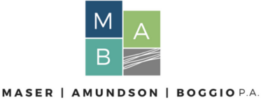“Navigating Eldercare with Holistic Planning”
A Conversation with Brenna Galvin, Ann Hartlaub, and Brittany Metzig
 In the latest episode of Beyond the Numbers by Bond&Devick, Brenna Galvin, elder law attorney and co-managing shareholder at Maser, Amundson & Boggio, joined Brittany Metzig of Bond&Devick and Ann Hartlaub from Senior Care Authority to discuss the complexities of aging and the essential planning required to ensure loved ones are well cared for. The conversation provided valuable insights into the financial, legal, and care-related aspects of eldercare and shed light on the importance of a coordinated, holistic approach.
In the latest episode of Beyond the Numbers by Bond&Devick, Brenna Galvin, elder law attorney and co-managing shareholder at Maser, Amundson & Boggio, joined Brittany Metzig of Bond&Devick and Ann Hartlaub from Senior Care Authority to discuss the complexities of aging and the essential planning required to ensure loved ones are well cared for. The conversation provided valuable insights into the financial, legal, and care-related aspects of eldercare and shed light on the importance of a coordinated, holistic approach.
The Importance of Early Planning
Brenna began the discussion by highlighting the inevitability of aging and the need for proactive and comprehensive planning. “We all are going to need to plan for the potential of dealing with incapacity, the potential of needing care – either supportive services in our home or the need for more long-term care services at home or in a senior care community,” she explained. Aging inevitably brings care needs, and the choices surrounding care are rarely straightforward and can be overwhelming.
At Maser, Amundson & Boggio, Brenna emphasized our firm’s approach to life care planning, which considers the legal, financial, and care coordination aspects of eldercare. She noted that, “We’re the seat on the three-legged stool,” referring to how her team works with clients to balance these essential elements.
Why Holistic Care Matters
Brenna believes that planning ahead is crucial not only for peace of mind but also for ensuring the quality of care. “When we’re lucky, we get to walk with families for a long time through their journeys and help them navigate these decisions because often, it’s not a one-and-done. We’re going to plan for the worst and hope for the best, but we need to think through what are different avenues or routes that this might take,” she shared. Planning for incapacity or long-term care needs before they become urgent allows individuals to make informed choices that support their preferences, whether that’s staying at home or transitioning to a community setting.
By addressing these matters proactively, families can avoid the chaos that often comes with sudden decisions. Ann Hartlaub echoed this sentiment, emphasizing the comfort and dignity planning ahead brings to the entire family.
Building a Team for Success
A critical component of eldercare planning is creating a reliable support system. Brenna explained, “It’s really important to build a team… you’re going to need the support of your loved ones, the support of a professional team as part of this.” This “team” extends beyond just family members and includes professionals such as elder law attorneys, financial planners, and care coordinators. According to Ann, “It’s helpful to identify who in your circle will advocate for you and help you make informed decisions, even when emotions run high.”
Brenna reinforced the importance of understanding each person’s role within the caregiving team. “We don’t go through this alone,” she remarked. “There are many ways people can contribute based on their strengths and availability, whether it’s financial management, transportation to appointments, or offering emotional support.”
The Roles of Family and Friends in Eldercare
An often-overlooked element of eldercare planning is how to divide responsibilities among family members and friends. Ann and Brenna shared their experiences of coordinating care within their own families, noting that each person’s “gifts” and skills should guide their roles. Whether it’s organizing meals, handling finances, or providing direct caregiving, understanding who is best suited for each task ensures that no one person is overwhelmed.
Ann shared a personal example from her own family, explaining how, when they plan family vacations, each sibling takes responsibility for different aspects of the trip. This approach can be replicated in eldercare planning, ensuring everyone has a role to play and that family members can lean on each other for support.
The Holistic Approach to End-of-Life Planning
As an end-of-life doula, Brenna brings a unique perspective to the planning process. She described her work as providing emotional, practical, and spiritual support to individuals and families, especially as they navigate the final stages of life. She views this work as an extension of her legal practice, where clients are supported not only through the legal steps of end of life, but also emotionally and physically.
“We love to work really closely with our clients’ other advisors, like their financial advisor, their accountant, their care coordinators, geriatric care managers, placement assistants, and help coordinate that team,” Brenna said, highlighting the need for an approach that addresses both the legal and emotional complexities of aging and end-of-life care.
Final Thoughts
Eldercare planning is not just about creating legal documents or financial strategies; it’s about ensuring that families are equipped to make informed, thoughtful decisions that align with their loved ones’ values and preferences. As Brenna and Ann highlighted, early planning and building a support team are so important for aging with dignity and peace of mind.
“The best situations or the best experiences I’ve had with clients are those times where we’ve been able to see them through kind of the initial what-if planning, you know, the essential legal documents to navigating a diagnosis, making sure they get the services they need, and then helping post-death with the administration and helping the families during time of transition,” Brenna concluded.
For more information about life care planning and the holistic services provided by Maser, Amundson & Boggio, visit our website.
